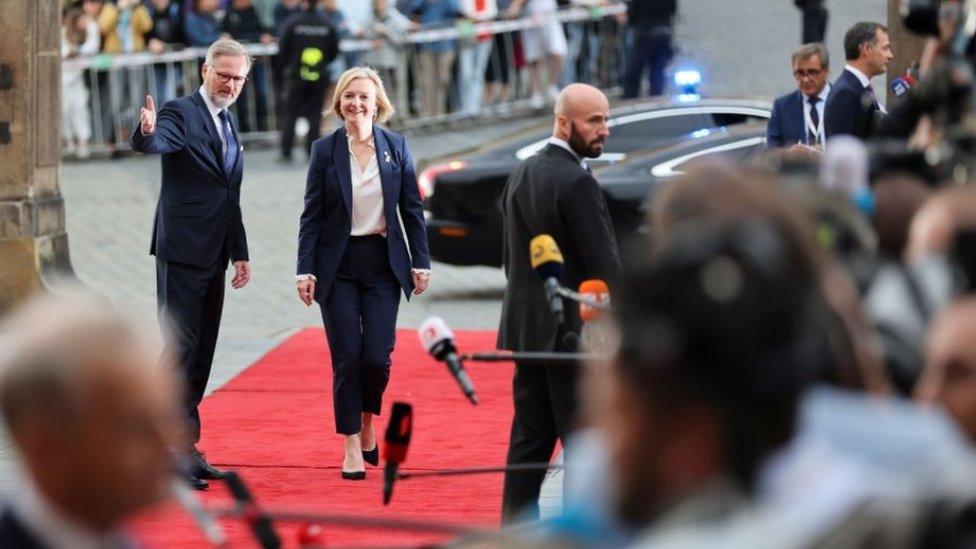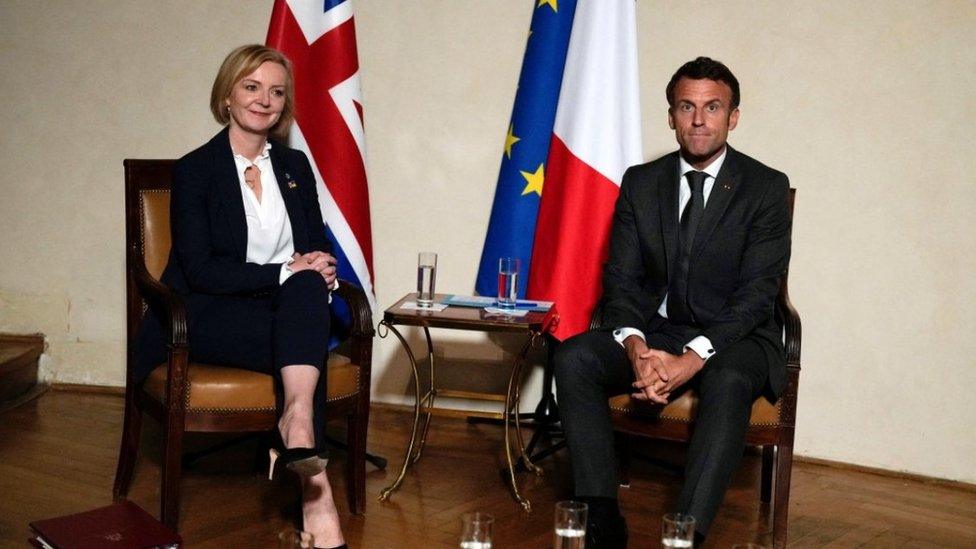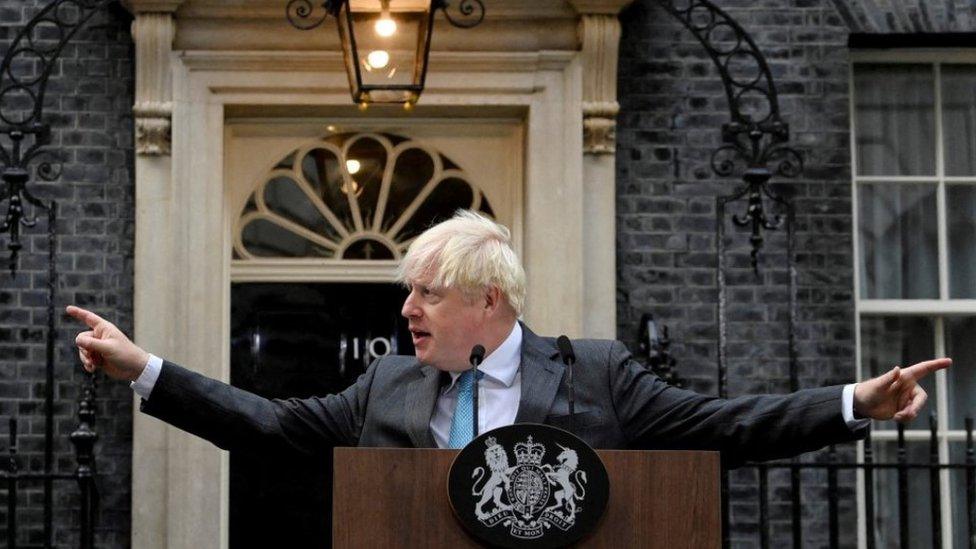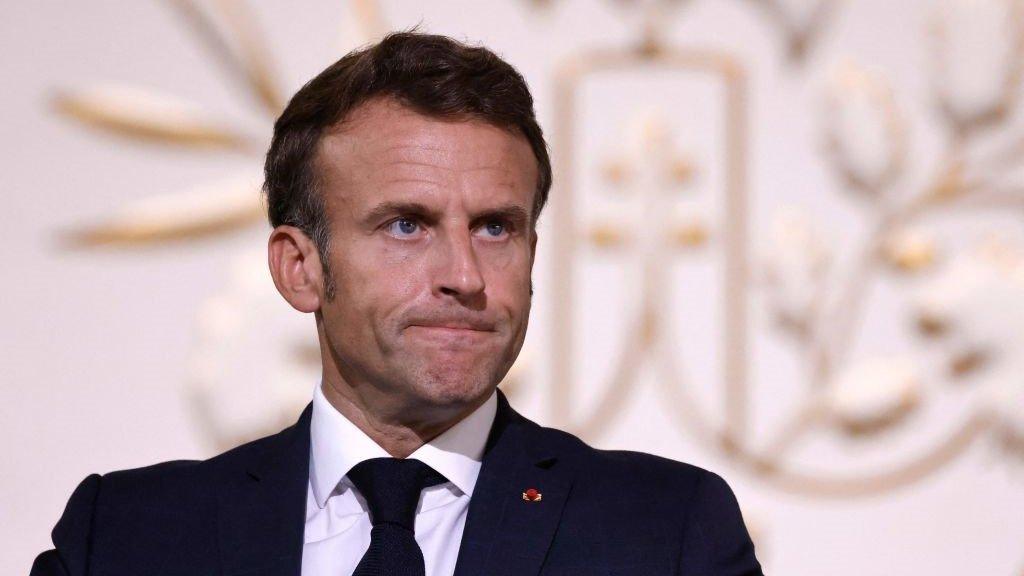Tory leadership race: EU leaders fret the 'What's Next'
- Published

Un tout petit peu de Schadenfreude there certainly is in EU circles at the spectacular demise of Prime Minister Liz Truss and the tumultuous state of UK politics.
Just take a look at the German political weekly Der Spiegel, its Friday front cover resplendent with an illustration of a banana whose tip morphs into London's famous Big Ben clock tower, adjacent to parliament.
The caption "Banana Island" is a play on the term banana republic and the headline reads: "How Britons made themselves the laughing stock of Europe."

Brussels is still massaging a bruised ego following the Brexit process and the clear message they believe to have received from British leaders ever since that the UK was too good for the EU.
Media mockery aside, there's a lingering conviction in EU capitals that Brexit actually left both entities - the EU and the UK - weaker. Economically and in terms of security and defence on the world stage. More on that in a moment.
And behind closed doors, many European politicians point to the instability on glaring show in UK government circles as being directly linked, in their opinion, to ideological splits unleashed in Britain and Northern Ireland during the Brexit debate.
But you won't be surprised to hear that it's hard to find an EU leader who'll say this on the record.
They've pretty much all laughed about Britain's Daily Star publication having set up a live webcam on a lettuce, to see whether it had a longer shelf-life than Liz Truss in No 10 Downing Street. Lettuce-gate was widely written about in European media and it was noted too here in Brussels that the deputy chairman of Russia's Security Council, Dmitry Medvedev, tweeted on Thursday, "Bye bye @liztruss, congrats to lettuce."
All that said, though, EU leaders need and want to work with the UK going forward. Whoever might be at the helm.

Truss attended the Meeting of the European Political Community in Prague this month
The EU's former chief Brexit negotiator, Frenchman Michel Barnier, probably came closest to making a link with "the B-word" when he tweeted: "Not all of these (UK) difficulties are due to Brexit, I am simply convinced that Brexit makes everything more difficult."
In fact, there's more EU hand-wringing than gleeful hand-rubbing right now, when purveying the political chaos in the UK.
News of Liz Truss's resignation after just 44 days as prime minister, following a much trumpeted, but real-world disastrous "mini budget", broke in Brussels just as EU leaders were making their way into a two-day summit.
There were raised eyebrows and the odd caustic comment about losing count of UK premiers.
Luxembourg Prime Minister Xavier Bettel mused that he hoped he could remember how many British prime ministers he'd survived. Mr Bettel has been in government for a decade. (With a new UK prime minister due to be announced in a week, the answer would be five. Four in the last three years alone.)
But EU leaders are more than aware they're not exactly sitting pretty themselves. They're here in Brussels to discuss skyrocketing energy costs, rising concerns about the what-next in Ukraine and the dilemma about how to handle China.
All these issues are ones on which they would like to co-operate closely with their geographical neighbour the UK, which Brussels views as sharing the same western liberal democratic values.
Take the recent meeting in Prague of all 44 European countries, bar Russia and Belarus, as a case in point.

Macron and Truss had a rather rocky start
The meeting - held at a time of crisis on the European continent - was the brainchild of French President Emmanuel Macron.
He was hellbent on getting the UK to attend. The summit wouldn't have been viewed as a success without that key continental player.
And this wasn't (just) about Macron's ego.
He and Liz Truss had a rather rocky start to her premiership. On the campaign trail she'd laughingly stated after being asked that "the jury was still out" as to whether the French president was the UK's friend or foe.
But in preparations for the Prague summit he wanted to ensure the UK would go home with a full goody bag. He discussed what were described as "ambitious" plans with Liz Truss on how to better co-operate on stopping people smugglers operating across the Channel.
On energy, the UK was re-integrated into the North Seas co-operation group building wind farms and energy interconnectors. And there were concrete discussions about Franco-British nuclear energy projects. There was widespread praise too from Eastern European leaders, the Dutch and others on UK leadership in providing military support for Ukraine against Russia's assault.
President Macron hoped to demonstrate that working with Europe - not necessarily inside the European Union - is a win for the UK even if, at times, politically awkward for some British politicians post-Brexit.
But now, EU leaders are wary of who might follow Liz Truss as the next UK prime minister.

Johnson only left No 10 last month
Rumours that it could be Boris Johnson were privately met with some mock despair.
"Seriously? Boris?" asked the representative of one key EU member state. "He left in disgrace not long ago. He's not a serious international player, even if the UK is."
Another EU diplomat questioned how Boris Johnson "could possibly be seen as a man a Conservative government could unite behind, when his party sent him packing because his scandals were seen as spelling disaster at the polls".
The concerns amongst European leaders are two-fold:
In terms of UK policy and attitude. No European leader doubts the UK will maintain its support for Ukraine but the EU hopes energy co-operation and what the Irish government described recently as a "new mood music" when it comes to solving problems with the Brexit agreement on Northern Ireland will outlive the Truss administration.
A fear I hear from my European contacts is that whoever follows Liz Truss as prime minister may well not have the political power or public backing to make the big, difficult decisions facing all the continent's leaders in these challenging times. Will the UK be a bit of a lame duck until it holds a general election, some EU diplomats ask.
Italy has certainly bridled at the Economist magazine using the term "Britaly" to suggest UK politics and economics are becoming as unreliable as Italy's.
Online agenzianova.com wrote that the comparison was laughable since Italy was now in the process of forming a new government based on a decisive and recent general election, while UK politics were already unstable when the Queen passed away, and are now once again in the throes of fresh and concerning political instability.
Related topics
- Published21 October 2022

